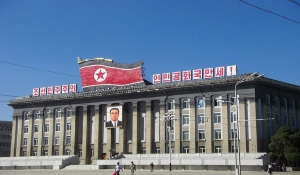Strategic Outcomes in the Korean Peninsula—Part II: Key Questions as Answered by Individual Analytic Efforts

Author(s): Astorino-Courtois, A. (NSI); Cooley, S. (Oklahoma State University); Dorondo, D. (Western Carolina University); Elder, R. (George Mason University); Kuznar, L. (NSI); Olsher, D. (Integral Mind); Popp, G. (NSI); Sleevi, N. (TRADOC); Suedfeld, P. (University of British Columbia); Wright, N. (Intelligent Biology)
Report Preview
Over the course of this project, multiple sets of questions were edited and added to the effort, resulting in a total of 29 questions. In this document, the individual teams have addressed as many of the questions in this list as addressed by their research and analytic efforts for this SMA project.
The list of 29 questions is divided into five sections throughout this report.
Section I: Regional Analyses includes questions examining the ins-and-outs, implications, and
potential outcomes from a regional perspective. These questions investigate: key actor interests, the
interplay of conceivable actions by these actors, conditions that would support or lead to potential
outcomes. Many of the SMA teams were able to apply their individual methodologies or tools to
address these questions. The modeling teams included TRADOC’s ATHENA, GMU’s Timed Influence
Net (TIN) modeling, and Integral Mind’s cognitive simulation. The analytic approaches included:
NSI’s I-R-C Analysis and Pathways Analysis, UBC’s Integrative Complexity, Intelligent Biology’s
Cognitive Assessment, NSI’s Quantitative Discourse Analysis, and OSU’s Strategic Media Messaging
Analysis. Finally, the SMA teams incorporated subject matter expert via NSI’s ViTTa effort and
analysis from an expert from Western Carolina University.
Questions from Section II: DPRK Analyses focus internally on the stability of the DPRK state and
economy. DPRK state stability are explored by modeling teams of ATHENA and Integral Mind
modeling teams alongside the NSI analytic and ViTTa approaches.
In Section III: Proliferation v. Denuclearization, the I-R-C and ViTTa analyses thoroughly review
conditions and options for denuclearization while the OSU team examines the messaging narratives
from Russian and Chinese media. Three SMA teams, Intelligent Biology, UBC, and Integral Mind, take
a cognitive approach to examining the way towards denuclearization.
Section IV: Regional Objectives, Actions & Implications covers future outcomes and explores the
implications of regional actions. In this section, the modeling efforts by GMU and TRADOC submit
future scenarios and examine the steps taken to get there. Two ViTTa analyses and work by the
cognitive assessment and discourse teams address how the US can work with partners in the region.
In Section V: Cognitive Assessment of KJU Confidence, Cognition, and Discourse, four SMA teams
shared a common corpus and conducted seven different analyses: quantitative discourse analysis,
cognitive mapping, thematic content analysis, integrative cognitive complexity analysis and motive
imagery scoring, application of the empathy checklist, basic emotive analysis, and discourse of deception. From these initial analyses, the teams went on to address questions of KJU’s regime confidence and assurance, and recommended communication strategies that would appeal to KJU’s communication styles and cognitive proclivities. For more in-depth reading, please refer to the full reports submitted by the individual teams. Links to these reports can be found in the appendix. Review the Part I report for a summation of the key findings across all of the individual efforts.
Comments